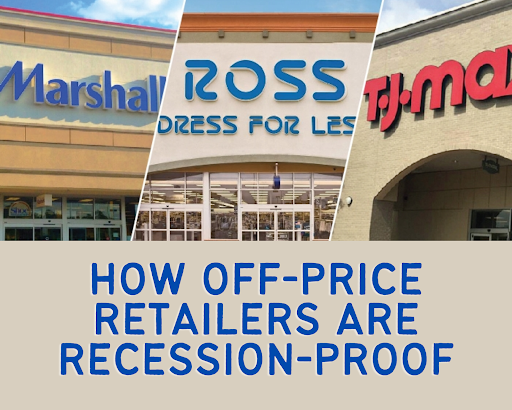How Off-Price Retailers are Recession Proof: The Secret to Driving Consistent Sales in a Challenging Market
Click on image to download high resolution version
By: Fiza Khan
You’ve probably heard that Amazon and other e-commerce players have forced most brick-and-mortar retailers to operate on razor-thin profit margins. As a result, department stores, apparel chains, and almost every other type of off-price retailer continues to struggle in the new economy. Consumers are constantly looking for value and remaining price-conscious when shopping online or visiting their local mall.
But in this challenging market, savvy brands have found ways to thrive. As more consumers embrace the thrifty lifestyle on a permanent basis, off-price retailers now stand out as more than just a temporary solution to recession-proof fashion.
These retailers are thriving in the current retail environment. In fact, they've proven to be recession-proof. While department stores and other premium retailers are struggling, off-price chains like TJ Maxx, Marshalls, and Ross Stores have continued to grow their sales and expand their footprint. Why? These retailers have identified a niche, segmented their target customers, and developed products that meet them there. In this brief article we’ll break down how an off-price strategy can be the secret sauce for driving consistent sales in a challenging market.
What is an off-price retail strategy?
An off-price retail strategy is the practice of selling or distributing products at a reduced price, usually from other retailers or wholesalers. An off-price approach is commonly practiced in apparel and retail. There are always new shipments that come in, and these are priced lower than what is currently in the store. This creates a constantly rotating inventory of products. The three major off-price retailers in the United States are TJ Maxx, Marshalls, and Ross Stores. All three have very similar business models, and the term “off-price retail” is often used to describe them collectively.
TJ Maxx, Marshalls and Ross have all seen growth in a challenging environment
These retailers have proven that their strategy isn’t just viable in a regular economy, but that it thrives in a challenging one. In fact, 2017 was the best year for TJX (the parent company of TJ Maxx and Marshall’s) in their history. What’s driving this growth? Consumers are increasingly shopping for value, rather than for a particular brand. More people are looking for ways to save on their everyday purchases, and these off-price retailers are positioned to meet that demand.
Adapting to Meet Consumer Needs
The growth of off-price retailers is a result of consumers’ needs, not just their wants. It’s an evolution of the traditional retail model, where customers are looking for a solution to their problems and challenges. These off-price retailers have found a niche and are catering to consumers’ needs by: - Selling quality, name-brand items at discounted prices - Providing a wide selection of products for every member of the family (including children, toddlers, and infants) - Accepting returns without a hassle. These are the factors contributing to their crowded store, flooded sales, and overflowing shopping carts.
Conclusion
Overall, off-price retailers have proven to be recession-proof because they’ve been able to adapt to meet their customers’ needs: - Customers want to save money, but they also want quality products. By buying name-brand goods at discounted rates, customers are getting a good deal. If you're looking for a wholesaler with quality products for your off-price retail business, OFFPRICE Show's vendors can be your best bet. The OFFPRICE Show is the largest off-price trade show for retailers in the United States, giving you access to the best vendors in the industry. With the OFFPRICE Show, you have the opportunity to meet with brands and suppliers that offer everything from apparel to accessories and more.

